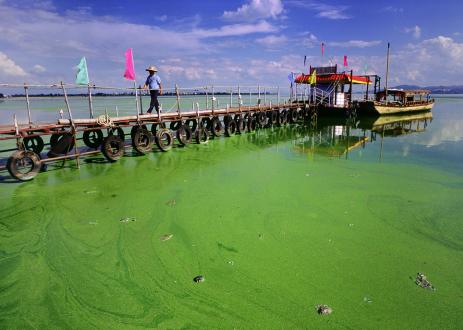富营养化:解决营养污染的政策,行动和策略

Synopsis
该政策说明概述了全球各地的行动,政策和机构,以解决营养污染和富营养化。
Key Findings
In order to reverse eutrophication trends and mitigate nutrient losses to aquatic ecosystems, policymakers should:
Implement research and monitoring programs to characterize the effects of eutrophication, collect water quality data, and inform adaptive management strategies. Information is a key element in the development of robust strategies to reduce eutrophication.
Raise awareness of eutrophication. Eutrophication and its effects are not well understood by the public or policymakers. Public awareness campaigns, school environmental education programs, and targeted outreach and technical assistance are all important components of raising the profile of eutrophication within communities and building a foundation and support for effective actions to reduce nutrient losses and eutrophication.
Implement regulations to mitigate nutrient losses, such as standards, technology requirements, or pollution caps for various sectors.
Create fiscal and economic incentives to encourage nutrient reducing actions using taxes and fees, subsidies, or environmental markets.
保存和恢复捕获和循环营养的天然生态系统。
Establish strong, engaged, and coordinated institutions to address eutrophication. Effective institutions to implement and enforce policies are important to the success of any eutrophication strategy, especially where multiple jurisdictions are involved.
在设计综合政策以解决富营养化时,利用环境协同作用。与减少营养污染相关的许多政策和活动具有与其他环境问题(例如气候变化,烟雾和酸雨)的协同作用。必威官网是真的吗选择和实施的政策应寻求最大化环境利益。
Executive Summary
Nutrient overenrichment of freshwater and coastal ecosystems—or eutrophication—is a rapidly growing environmental crisis. Worldwide, the number of coastal areas impacted by eutrophication stands at over 500. In coastal areas, occurrences of dead zones, which are caused by eutrophic conditions, have increased from 10 documented cases in 1960 to 405 documented cases in 2008. In addition, many of the world’s freshwater lakes, streams, and reservoirs suffer from eutrophication; in the United States, eutrophication is considered the primary cause of freshwater impairment.
项目
-

水质交易
Visit ProjectAdvancing voluntary and market-based solutions for improving water quality in a manner that maximizes economic efficiency and maintains environmental integrity.
部分 Water -

Eutrophication and Hypoxia
Launch PlatformLaunch Platform Visit Project映射,共享数据以及对全球富营养化和缺氧的认识日益增长。
部分 Water

